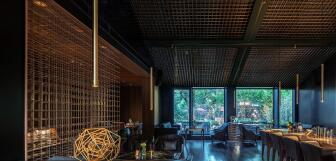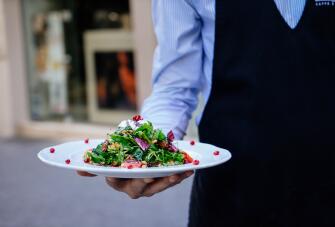Restaurant Interior Design Themes to Make Your Business Pop
When you dine out, the star of the experience will always be the food. But there’s so much more that goes into making a great dining experience than the meals themselves. From serving food correctly to the latest restaurant food trends, there are many things you need to pay attention to to provide a special experience for your guests.
One thing that restaurateurs need to pay particular attention to is the design and layout of their restaurant. A well-planned interior design can transform the atmosphere of your restaurant, elevating a good meal into a memorable dining experience.
Here are some interior design ideas you can explore to help your restaurant provide an amazing dining experience.
Hire an interior designer
Bland interior design creates an extremely poor first impression for guests arriving at a restaurant. It’s often memorably bad - the mass-produced furniture, shabby paint and plastic plants that look like they were set there in the 70s. The food often has to be stellar to make up for bad decor.
While there’s nothing inherently wrong with using mass-produced furniture and decorations, doing so can all too often give a space a shabby, cold feeling that lacks personality. You get the same feeling in places like airports or hotel chains – it all feels very impersonal like you could be anywhere.
To avoid fudging your interior design, especially if you don’t have an eye for it, you might consider hiring an interior designer. An independent designer will assess your space and your business to come up with a design and plan that will work for you.
Hire an artist
A great way to give your restaurant’s interior some personality is to hire an artist to create custom artwork. Find a great painter to do a mural on one of your walls. Hire a photographer to snap some sophisticated shots that you can frame and hang. Engage a ceramics expert to create a unique set of dishes.
Having unique pieces of artwork in your dining area will give your restaurant that sense of personality that makes people feel at home.
Decorate with plant life
Do you really want to breathe some life into your restaurant? Start dotting your dining area with some striking plants.
People like to be surrounded by natural, earthy decor. It’s been well documented that people feel more at ease and better able to enjoy themselves when they’re around nature, like running water or plants [1].
There are many different species of plants that can make your dining area pop that are low-maintenance, like rubber plants, ivies, palms, and ferns [2].
And why stop at plants you put in pots? Add some greenery to your table settings [3]. Decorate your tables with a floral centrepiece to give a bare table a splash of scent and colour.
Open up your kitchen
It’s very common for restaurants to overfill and clutter their dining areas with unnecessary or mismatched decorations. Many others have focused on opening up their dining areas as much as possible, even going so far as to give guests a view of the kitchen [4].
Opening up a view into your kitchen creates a sense of intrigue – the guests have a full view of what’s going on in the kitchen and how their food is being prepared. Doing this can work particularly well if your kitchen has a unique draw, like a wood-fired pizza oven or a large barbeque. Undoubtedly, this will increase anticipation for diners as they watch their dishes being freshly cooked and plated.
If opening up your kitchen can’t be done, try giving a view of your restaurant’s wine cellar, spirit collection, or other products. The more intimately your customers get to know your products and how they are stored, created, and prepared, the more they are likely to spend.
Giving customers a view of your products will also give your servers a chance to upsell. Here are some top tips for upselling in restaurants.
Minimalism
You know the old saying: less is more. That’s exactly the philosophy behind a particular style of decor that’s taken hold of a lot of restaurants [5].
Minimalism is the practice of stripping out clutter, where objects, space and lighting hold equal importance in the makeup of a room. It is an exercise in restraint and requires you to get rid of everything except the bare essentials.
A minimalist approach to your decor might require you to forego tablecloths, padding on chairs, wall decorations, or anything else that is not strictly necessary to the act of eating. The effect is a clean and sometimes austere look that many people find incredibly attractive.
Use a consistent colour scheme
When choosing colours for your restaurant, you need to choose a consistent colour palette and stick to it [6].
Try to use colours that complement each other, using well-known palette combinations. Also, make sure that the colours you choose match the food you’re serving. Earthy tones like burgundy, mustard, and chocolate will go well with Mexican food, while bright blues and oranges might complement a menu based around seafood.
Turn to your local area for inspiration
If you’re really stuck for ideas for your decor, you can always turn to your local area for ideas. There may be things that will spark your imagination and help you find the right design for your business.
If, for instance, your restaurant is located in rural England, you may want to opt for a muted, tonal colour scheme, an open space that looks out onto the rolling hillsides, and rustic furniture and wall decorations to stay true to your surroundings.
Community-focused dining
Most restaurants focus on table service. A table-based dining experience emphasizes the experience of everyone at a table, matching portion sizes, the type of dishes and cutlery and the table settings for this context. This type of experience usually focuses on 1-10 people and is how most people eat when they go out.
But what if there were no individual tables? What if you shared one table with the rest of the restaurant?
There is a trend in lots of restaurants to design their dining areas so that parties aren’t siloed off into individual tables but share one large table. This community-centred design [7] is meant to emphasize the individual diner’s place in a larger community of food lovers.
Bathroom design
Your interior design plan shouldn’t just stop at your dining area. Every last bit of your restaurant should be consistent. This means focusing even on the areas that you may not expect even need a design.
A clean and nicely presented bathroom is just as important as a well-decorated dining area. Bathrooms don’t have to be boring and clinical – it’s possible to make a bathroom just as striking as the dining room you decorate or the food you serve [8].
The question of music
Your restaurant’s design shouldn’t just focus on objects you can see. It can also incorporate the other senses, like smell, touch, and sound.
The music you play in your restaurant should fit your business. Invest in a good sound system. Get to know the acoustics of your space. Play music that’s appropriate to the atmosphere you’re creating. If you’re serving Spanish food, you may not want to play classical Japanese. If you’re serving Polish food, maybe skip the Ethiopian jazz. Fitting music can add a lovely ambience if that’s what you’re aiming for.
Manage your floor plan with an elite EPOS system
One of the most important elements of your interior design is your floor plan. You want to get as many tables into your space without over-crowding and so that people have enough space to move around, and have some privacy while they eat.
While redecorating and shifting tables around is important for optimizing your space, it can be confusing.
With an Epos Now Restaurant EPOS system, this process is made very simple. With our systems, you can:
- Streamline service, enhance communication, and take the complexity out of managing orders.
- Track time-at-table and manage floor plans in real-time to boost table turnover
- Eliminate costly errors with automated ordering and seamless communication
- Streamline back of house operations with a comprehensive Kitchen Display System
- Group by course and order type to speed up preparation and reduce customer wait times
Contact Epos Now today to find out more about our systems.
Other blog posts you might like:



